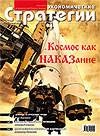Stagnation doesn’t Give Up
The paper considers changes of the “Economic Strategies” opportunistic index (OIES) in January-May 2014. The contribution of supply and demand indices into OIES is estimated. Industrial production analysis is performed.

The paper considers changes of the “Economic Strategies” opportunistic index (OIES) in January-May 2014. The contribution of supply and demand indices into OIES is estimated. Industrial production analysis is performed.
Oil prices forecast for the period from July 2014 to December 2015 prepared by the Institute of Energy Strategy in collaboration with the Institute for Economic Strategies based on neural model taking into account the experience of the world oil market functioning in the last decades.
Crisis of the present involves changing management practices. A search for an effective knowledge-action methodology in a mobile, multifactor, nonlinear environment is conducted. Principles and methods of indirect, matrix, reflective, pointlike, reflex, synergetic control of people and events is formulated. Requirements for intellectual, creative and psychophysical status of a decision maker are increasing. The problem of competence limits of the ruling class can be solved by changing the managerial elite staff or by reducing the overall system level.
The article deals with the problem of assessing competitiveness of projects on equipping health institutions with high-tech medical devices, for example — medical devices for active-passive mechanical therapy, taking into account their price characteristics, functional and operational capabilities as well as the type of health care institution and patient population needing rehabilitation with the use of such high-tech products. To assess the competitiveness and financing of such projects it is proposed to apply the expertise method and principles of project financing, widespread in the economy.
The author analyzes the place of basic ethic question — the problem of individual choice — in the polemics of A. Smith with B. Mandeville, theorems of R. Coase, K. Arrow, in “prisoner’s dilemma” and other liberal theories. She arrives at the conclusion that modern scholars, like representatives of classical school, consider ethical behavior of human as a key driver of economic development and welfare. The author also concludes that spiritual and moral education is a particularly important social good.